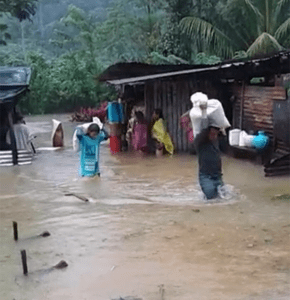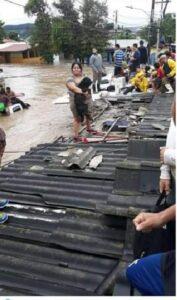[:en]Social Movements Lead Recovery from Devastating Back-to-back Hurricanes in Central America[:]
Faced with voids in government support, particularly in two of the hardest-hit countries, Honduras and Guatemala, social movements have stepped in to carry out essential needs assessments and emergency relief efforts. Simultaneously, movements are coordinating at the regional level to ensure not only emergency relief, but a just recovery grounded in radical self-management and mutual support, building upon a people-to-people model popularized by Puerto Rican social movements in the wake of Hurricane Maria in 2017. Grassroots International has launched an emergency appeal to support these efforts in Central America and is in close contact with partners on the ground. The following is some initial analysis of the situation shared by movement partners on the frontlines of the crisis.
Climate chaos, COVID and corruption – a deadly combination
In the midst of a record-breaking Atlantic hurricane season, that Eta struck Central America just as the US withdrawal from the Paris Climate Agreement became official could not be more tragically ironic. The Honduran government rightly pointed to the Eta catastrophe as yet another example of the uneven impacts of climate change, with countries that have contributed least to global emissions often among those hit the hardest. What it failed to acknowledge, however, was its own promotion of environmentally destructive projects and its complicity in the extreme suffering of its population at present, particularly among peasant, Indigenous and Afro-descendent communities that have faced systemic marginalization and repression since the country’s military coup of 2009.
Miriam Miranda of the Black Fraternal Organization of Honduras (OFRANEH), representing Afro-Indigenous Garífuna communities, connects multiple dots as she puts the current situation into context. She explains that Hurricane Mitch, which ravaged the country over two decades ago, followed by numerous other manifestations of climate chaos, provided ample warning of Honduras’ great vulnerability, yet:
There does not exist any disaster prevention strategy on the part of the government, nor has any sort of national disaster response been prepared… The very difficult situation we’re in not only lays bare the lack of prevention, but also how corrupt governments and political classes do not plan to save lives.
Miranda adds that the extent of devastation is also a direct result of government policies supporting expansion of palm oil plantations and other extractive industries, often involving violent displacements of the communities inhabiting the land. As a result:
Many parts of Honduras’ mountains have been destroyed, and many watersheds have been destroyed to such a degree that heavy rains are converted into a threat for the whole of the Honduran population.
Communities already inundated with water are receiving more water, Miranda laments, and the natural systems that could have helped to protect against flooding such as wooded areas have been largely destroyed. Furthermore, land clearings for plantations and megaprojects have not only left the land degraded and more prone to flooding, but have pushed communities onto marginal lands, making them particularly vulnerable to landslides and other dangers when storms strike. This is why, “In a city like San Pedro Sula, there are thousands of displaced peoples, thousands of people, including Garífunas, who lost absolutely everything due to living in high-risk zones.”
Faced with such conditions, OFRANEH is supporting emergency relief efforts, as it has throughout the COVID pandemic, while continuing to mobilize against their people’s displacement and increased vulnerability in the face of stronger and more frequent climate shocks. Such work forms a core part of OFRANEH’s approach to Black and Indigenous liberation.
 Representatives of the Peasant Unity Committee (CUC) of Guatemala describe a similarly dire situation, with “dozens of flooded and isolated communities, damaged houses and infrastructure, hundreds of hectares of peasant crops completely lost to overflowing rivers, absence of shelters and overcrowding of families,” adding that: “As with other tragedies, the government response has been absent, slow or inefficient.” Situations of overcrowding among evacuees, both in Guatemala and Honduras, are particularly concerning given that both countries are still reeling from COVID-19, with government inaction contributing to skyrocketing rates of the virus in both countries. The UN Office for the Coordination of Humanitarian Affairs (OCHA) was already sounding the alarm on new outbreaks of the virus within makeshift shelters of Hurricane Eta victims before Iota struck.
Representatives of the Peasant Unity Committee (CUC) of Guatemala describe a similarly dire situation, with “dozens of flooded and isolated communities, damaged houses and infrastructure, hundreds of hectares of peasant crops completely lost to overflowing rivers, absence of shelters and overcrowding of families,” adding that: “As with other tragedies, the government response has been absent, slow or inefficient.” Situations of overcrowding among evacuees, both in Guatemala and Honduras, are particularly concerning given that both countries are still reeling from COVID-19, with government inaction contributing to skyrocketing rates of the virus in both countries. The UN Office for the Coordination of Humanitarian Affairs (OCHA) was already sounding the alarm on new outbreaks of the virus within makeshift shelters of Hurricane Eta victims before Iota struck.
CUC has lambasted the Guatemalan government for the inadequacy of its response in this moment of greatest need, in contrast to “the hundreds of thousands of quetzals (Guatemalan currency) that have been spent to mobilize police and military personnel who only carry fear and anxiety during states of exception,” including violent evictions of peasant and Indigenous communities from their lands. Government misuse and abuse of resources in the face of the combined COVID and climate crises have been similarly called out by OFRANEH and by other movements in the region. The regional coordinating body of peasant movements, CLOC-Vía Campesina (the Latin American Coordination of Rural Organizations), sums it up that:
In countries with neoliberal governments, we’ve seen much corruption in the face of the pandemic, and now the hurricanes, along with a lack of disaster prevention and support plan for the people. This has generated loss of human lives, together with infrastructural and economic losses. Under such circumstances, we reaffirm the refrain “Only the people save the people (Solo el pueblo salva al pueblo).”
“Solo el pueblo salva al pueblo”
 Taking this refrain to heart, social movements have been among the first responders in the aftermath of Eta and now Iota, conducting needs assessments and emergency relief in communities that have lost nearly everything yet are largely cut off from any other forms of support. In Guatemala, where impacts have been more confined to particular parts of the country, CUC has put out a call for support to impacted peasant communities, reminding Guatemalans that:
Taking this refrain to heart, social movements have been among the first responders in the aftermath of Eta and now Iota, conducting needs assessments and emergency relief in communities that have lost nearly everything yet are largely cut off from any other forms of support. In Guatemala, where impacts have been more confined to particular parts of the country, CUC has put out a call for support to impacted peasant communities, reminding Guatemalans that:
During these months of pandemic, the foods that have arrived at the tables of Guatemalan families have been provided by the hands of peasants who have not stopped working from sunrise to sunset to produce food, many of whom have now lost crops, animals, clothing and housing.
At the regional level, CLOC-Vía Campesina has formed an emergency committee that is coordinating directly with government, UN and nongovernmental bodies on emergency relief efforts, as well as coordinating with global allies like Grassroots International to bring direct support to movements on the frontlines of the crisis for the rebuilding of homes, farms and infrastructure. At the same time, they are pushing for a just recovery process over the medium and longer terms, supported by “progressive public policies that respect people’s lives and that support peasant agriculture.” A key component of this vision is a rebuilding of now-devasted food and agricultural systems with an orientation toward food sovereignty, in which communities are empowered to feed themselves and the broader population through diverse, resilient food systems. According to La Vía Campesina Honduras:
The agricultural sector has suffered its greatest destruction in the last 20 years; the losses are millions and incalculable. Until now the production of basic grains such as corn, rice, beans, vegetables that are basic products for food sovereignty have disappeared up to 80%, likewise thousands of hectares of coffee in the hands of small producers have been affected in the different regions of the country as a result of landslides and floods… Livestock has drowned.
Rebuilding from such devastation, as underscored by CLOC-Vía Campesina, will require “promoting the production of agroecological food, short circuits (of food transport) and healthy communities to avoid hunger” as well as “expanding the production of agri-food chains, transport, storage and distribution in nearby markets, native seeds, natural medicine and healthy consumption.” These are among the priorities that social movements are both calling for and making steps toward, even as they confront the extreme emergency needs of the present.
For Grassroots international’s Solidarity Program Officer for Latin America, Jovanna Garcia Soto, who has been coordinating directly with movement partners on the emergency appeal, the current crisis “brings back overwhelming memories of what happened when Hurricane Maria struck my archipelago, Puerto Rico, whose ultra-neoliberal government, like the governments of Honduras and Guatemala, placed the interests of capital above those of the people.” Another parallel she sees is how both the response by movements in Puerto Rico and by movements today in Central America demonstrate how community solutions based on mutual support and self-management save lives:
This is the path for a just recovery and the way to win the self-determination of our peoples. In these critical moments we have to stand up in solidarity with the Central American people impacted by hurricanes Eta and Iota. Our solidarity will define life or death, as we support grassroots groups and social movements organizing on the frontlines of the crisis now and working to dismantle the oppressive system over the long term. They are the backbone of the change towards a just and dignified world.
Donations to Grassroots International’s Meso-America Hurricane Emergency relief fund can be made here.

